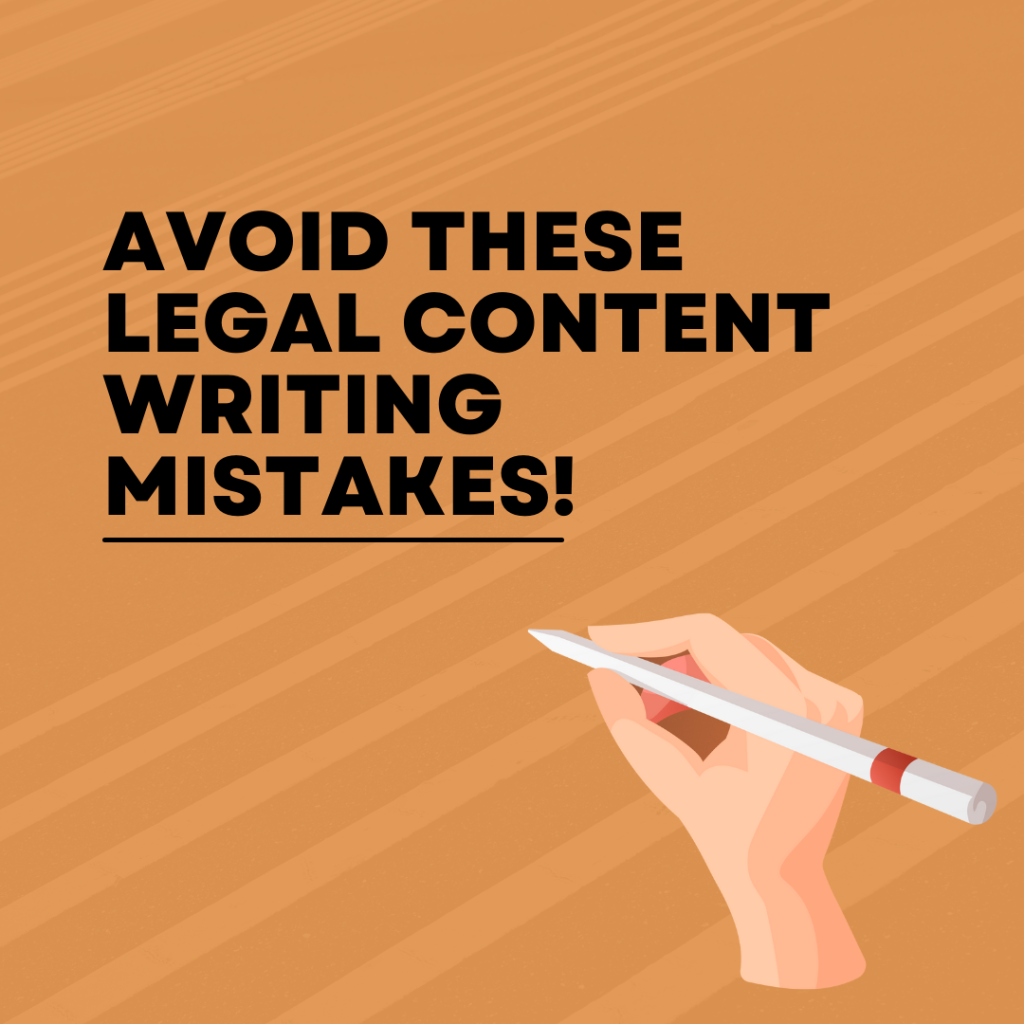Being a legal content writer is not for the faint of heart.
Well actually, that’s not true. It’s not as difficult as writing a dissertation. But it comes with its own set of challenges.
When it comes to content marketing, law firms face the same issues. They need content that shares how their legal services can help their clients. At the same time, they need to market themselves in a way that’s relatable.
That’s where a legal content writer comes in.
If you’re interested in becoming a legal content writer, find out what you can expect and 5 mistakes that you want to avoid.
The Life of a Legal Content Writer
Legal content writers should be able to do the following:
- Explain legal matters in an interesting and relatable way. Legal content writers should be able to take complex legal matters and make them simple to understand.
- Produce high-quality, relevant content. Every law firm needs content that’s fresh and free of mistakes. Legal content writers should be able to produce content that’s SEO-friendly and caters to the clients’ concerns.
- Establish a law firm’s brand. Working with legal content writers helps law firms establish a strong online presence.
As a legal content writer, think of yourself as the glue that holds the law firm’s brand together. You can write different content like blog posts, FAQ pages, and case studies for lawyers.
But you’re just like every other writer. You are prone to mistakes. Here are 5 common mistakes that you want to avoid as a legal content writer.
Writing In Legalize

Should you have some understanding of the law as a legal content writer? Absolutely!
But does that mean that you have to bore readers with your legal knowledge? No.
It’s important for you to create content that speaks to your law firm’s credibility. But you don’t want to turn readers off by bombarding them with legal jargon.
Putting too much legal jargon in your content can actually work against you. If your content is too difficult to understand, it may rank low in search engines.
A good rule of thumb is to write at an 8th grade level. If an 8th grader is able to understand your content, you’re on the right track.
Focusing Solely On Expertise
In addition, another common mistake is focusing solely on the law firm’s expertise.
You may be writing for the best law firm in the country. I promise you the client won’t care. All the client cares about is one thing: how the law firm can help them.
This one concern can be used to structure your content. Instead of fluffing up your content with the law firm’s credentials, focus on how the law firm can help solve their clients’ problems.
This doesn’t mean that you don’t have to share your law firm’s credentials. In fact, you can share how your law firm’s expertise can help solve a client’s issues.
But you don’t want to exaggerate the law firm’s experience, which leads to the next mistake.
Writing In Absolutes

The legal content that you write is not legal advice. Unfortunately, it’s very easy for your clients to consider it as such.
That is why you don’t want to write in absolutes.
What are some examples of writing in absolutes? Using the words “guarantee”, “promise”, “best”, and “expert.”
When you use these words in your content, it seems like you’re promising a certain outcome for their situation. Lawyers don’t even do this when consulting with their clients.
In some cases, using this type of language in your content can seem unethical.
To avoid these types of misunderstandings, do not write in absolutes. Use words like this “may” or “could” happen for you.
Hiding Behind Keywords
Undoubtedly, another common mistake is keyword stuffing.
In the world of SEO, keywords are important. However, some legal content writers look at keywords like Mario coins.
The more that they appear in a blog post or website page, the higher that content will rank on a search results page. But that’s not the case.
Flooding your content with keywords doesn’t help. When it comes to keywords, you want to think about the following information:
- Search intent. What keywords are your clients likely to type when they use a search engine?
- The keyword’s search engine rankings. How high does your keyword rank?
- The keyword’s length. Are your keywords short-tail or long-tail?
Instead of stuffing your content with keywords, do some research and see how you can use your keyword efficiently.
Using Outdated Information

Last but certainly not least, putting outdated information in your content is the kiss of death.
The legal industry is just like every other industry. It’s important to stay relevant and on top of the latest changes.
The last thing you want to include in your content is data that’s old or inaccurate. It can make your content irrelevant and affect your credibility.
It can also affect your content’s search engine rankings. Search engines like Google thrive on content that is current and up to date.
To avoid making this mistake, always double check your sources. How recent are the statistics that you’re using?
A good rule of thumb is to use statistics as recent as 2019.
Final Thoughts
At the end of the day, legal content writers are like other content writers. They create legal content that caters to a specific audience and addresses their issues.
Avoiding these mistakes will help you create legal content that’s relevant and valuable for other law firms.
For more information on legal content writing, check out my blog post 5 Authentic Ways That Content Writers Can Boost A Lawyer’s Online Presence – Valeria Publications.
Share your comments below.








Leave a comment